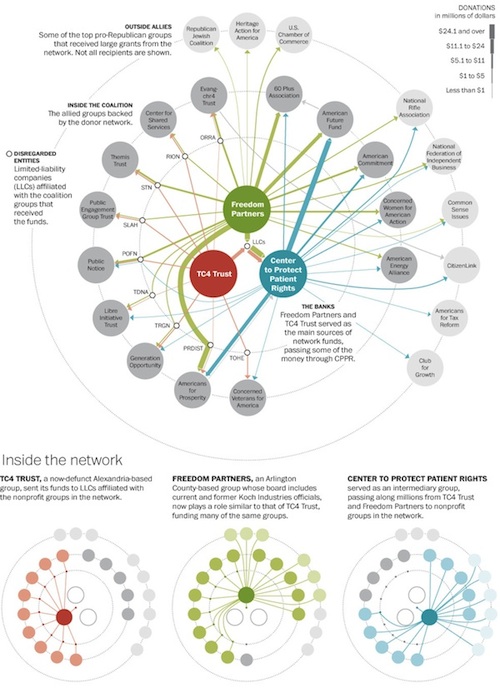A couple of days ago in The Washington Post, they ran an article about the Koch Brothers’ impact on the 2012 elections. In short, it was about $400 million through various “dark money” groups that they work with (one of the most prominent seems to be this Center to Protect Patient Rights). Unions put about $400 million into 2012 elections (mostly supporting the left); the Koch network total was about $407 million, meaning that this shadow association basically spent more than the entirety of all unions in the United States. How does this happen in such a complicated, evolved society as ours? Cue a Notre Dame Law School professor:
“It is a very sophisticated and complicated structure,” said Mayer, who examined some of the groups’ tax filings. “It’s designed to make it opaque as to where the money is coming from and where the money is going. No layperson thought this up. It would only be worth it if you were spending the kind of dollars the Koch brothers are, because this was not cheap.”
OK. So how does it work, in layman’s terms? Well, to start, here’s a visual web of the associations:
Basically, these two things near the center — Freedom Partners and TC4 Trust — are responsible for moving about $302 million of the total $407 million; they are groups essentially serving as banks. The tax returns for those two companies were done by the same person — a Kansas City-based partner in the BKD accounting firm. These two funds move money through the Patients Rights group mentioned above, and also through companies incorporated in Delaware whose names keep shifting. A company called Eleventh Edison, for example, was renamed Corner Table and then Cactus Wren in a matter of months. Delaware requires very limited information about incorporated companies.
This all used to be run and coordinated by a guy named Sean Noble, but his role appears to be lessening.
Most of the money goes towards political ads and marketing materials, such as this one in Wisconsin’s recall election for Governor:
There are approximately a million and a half problems with the entire Koch Brothers set-up, most notably that two basically unaccountable billionaires are controlling American politics, but their system is set up in such a way that it’s hard to grab at them — and the first amendment does help protect some (if not much) of their actions, as well as recent Supreme Court decisions. For better long-form reads on the brothers, check here, here, and here.
They’re expected to be active in the 2014 elections, with some hints to strategy here, and they just launched a $2.5 million ad campaign against three of the most vulnerable 2014 Democrats: Kay Hagan, Mary Landrieu, and Jeanne Shaheen. Predictably, most of these ads hit on ObamaCare. Here’s the Hagan one:
Two other things you should check out as relate to the brothers — first, there’s a documentary “exposing” them. Obviously it’s very liberal and has a couple of flaws here and there, but it has some good soundbites and paints an interesting picture:
Finally, there was a piece on CBS Sunday Morning a couple of weeks back about forgeries in the wine world — basically, rich-ass people buying wine they think is from the 1700s and, in fact, it was made last week somewhere in Florida. One of the main characters in the piece is another Koch brother, and if you watch it all the way through, you’ll realize these dudes are truly the “1%” at its worst. I’m not saying they didn’t earn their money — how they built up their company has ties to the idea of the American Dream — but how they’ve acted since being mega-rich is amazing to see. Check this out:
The easiest way to defeat money? Ignore the messages they buy and vote with your brain and your heart. Unfortunately, sometimes that’s easier said than done.


One Comment
Comments are closed.